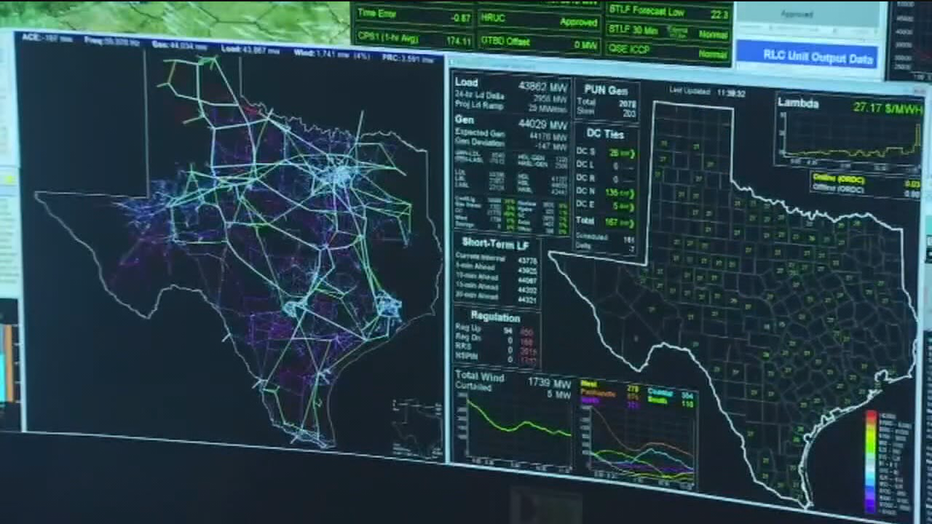Texas power grid operator approved for a 40% budget increase
ERCOT tells Public Utility Commission it is ready for winter
The Texas Public Utility Commission held its Winter Preparedness workshop Friday in Austin. ERCOT says it is ready.
"Texas power grid operator approved for a 40% budget increase" was first published by The Texas Tribune, a nonprofit, nonpartisan media organization that informs Texans — and engages with them — about public policy, politics, government and statewide issues.
Sign up for The Brief, The Texas Tribune’s daily newsletter that keeps readers up to speed on the most essential Texas news.
---
The Texas electric grid operator’s budget will grow 40% next year, adding nearly $119 million to its current $287 million budget. Much of that will come from charging higher fees to companies that sell power to consumers.
The fee increase will cost the average residential customer less than 20 cents a month, according to the operator.
State regulators at the Public Utility Commission approved the budget increase Thursday in a 4-0 vote.
The Electric Reliability Council of Texas needs more money to comply with new regulations, hire more employees and fight legal challenges, its lawyers wrote in state filings. ERCOT planned to grow its 843-person staff by 171 positions, adding attorneys, system operators and communications experts.

Public Utility Commissioners, who set regulations for electricity, decided against giving ERCOT all that it initially asked for, approving a slightly smaller fee increase and budget than the organization requested.
"It is important for ERCOT to look out into the future to have stability," Commissioner Will McAdams said. "The direction I’m coming at this from is I don’t like rate shock."
Critics of the increase had called for more transparency from ERCOT on how the money would be spent. They also argued that ERCOT could still meet its goals with a smaller fee increase.
In an October budget meeting with PUC staff, Michael McMillin, a lawyer representing Texas Industrial Energy Consumers, and Cyrus Reed, conservation director for the Lone Star Chapter of the Sierra Club, questioned why millions of dollars were going toward ERCOT’s general counsel’s office.
ERCOT budget documents show it proposes to spend $15.4 million more on the department and hire 14 attorneys.
"It's a large number of people they want to add in both legal and in their communications/PR department," Reed said in an interview. "Do they really need that many employees for things that aren't really their core function?"
ERCOT manages a growing and changing grid, the agency’s lawyers wrote to state regulators. More companies want to build various power sources, more users draw large amounts of power and more miles of transmission lines to transport electricity.
The ERCOT grid serves a majority of the state and is largely separated from the interconnected grids that serve the eastern and western halves of the United States.
Featured
Texas House members do not act on school voucher bill, fourth special session may be needed
It leaves an unclear future for Gov. Abbott's school voucher priority, which passed the Senate, but hasn't moved in the House.
"The Texas grid is more complex, dynamic, and diverse than ever before, and the pace of growth and change is accelerating," the ERCOT lawyers wrote.
ERCOT is also still dealing with the fallout from the grid’s near-collapse during the deadly February 2021 winter storm, when all types of power sources stopped working in frigid temperatures, plunging millions of Texans into darkness for days after ERCOT directed power utilities to shut down large swaths of the grid to prevent a catastrophic failure. Hundreds of people died.
Legislators told ERCOT to make various fixes after that, including putting into place financial and technological mechanisms to make the grid more stable and ensuring companies better prepared their power generation equipment for extreme cold.
ERCOT President and CEO Pablo Vegas said during the October hearing that ERCOT faces increasing legal costs and is hiring outside counsel to help handle lawsuits and interpret complex regulation. He also said legislation that passed this year required them to implement a number of changes to the way the grid and the electricity market operate.
"Many of these projects are time-sensitive and require ERCOT to increase available resources in order to address them," Vegas said. "The budget provides funding to meet the desirable delivery schedules and provide benefits as soon as practicable to the citizens of Texas."
ERCOT will increase its "system administration fee rate" from $0.555 per megawatt-hour to $0.63 per megawatt-hour in 2024 and 2025.
This marks the first fee rate increase since 2016, according to the agency. ERCOT had expected to raise the rate by 2022, but managers wanted to cut expenses after the costly 2021 storm, when the price of energy stayed at the maximum rate allowed — of $9,000 per megawatt-hour — for days, and natural gas prices spiked more than 700%.
Regulators review ERCOT’s budget every other year.
---
Disclosure: Young President's Organization - Lone Star Chapter has been a financial supporter of The Texas Tribune, a nonprofit, nonpartisan news organization that is funded in part by donations from members, foundations and corporate sponsors. Financial supporters play no role in the Tribune's journalism. Find a complete list of them here.
This article originally appeared in The Texas Tribune at https://www.texastribune.org/2023/11/02/texas-ercot-budget-increase-public-utility-commission/.
The Texas Tribune is a member-supported, nonpartisan newsroom informing and engaging Texans on state politics and policy. Learn more at texastribune.org.


